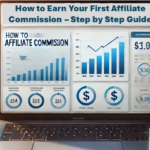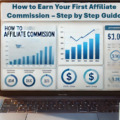10 Mindset Shifts That Helped Me Build a Six-Figure Affiliate Brand in One Year
Building a six-figure brand in just 12 months might sound like a far-fetched dream.
I know because I felt the same way when I started. The challenges ahead seemed daunting, and there were moments I doubted myself. But here’s the truth: achieving this goal isn’t just possible—it’s within reach if you embrace the right mindset.
Success in affiliate marketing—or any business—doesn’t start with fancy tools or complicated strategies. It begins with adopting a growth-oriented mindset that paves the way for long-term wealth-building strategies. For me, the most transformative shift was moving from a poor mindset to a rich mindset. That change was the foundation for everything I’ve built.
Let’s explore the two types of mindsets—the Poor Mindset and the Rich Mindset—and the transformative shifts that helped me build a thriving six-figure affiliate marketing brand in just one year. For more beginner-friendly tips, check out our affiliate marketing guide.
Discover the hidden reasons holding you back from online success—and how to overcome them in our eye-opening free report, ‘Why You’ll Never Succeed Online’
1. Scarcity vs. Abundance
- Poor Mindset: “I’ll never have enough.”
- Rich Mindset: “There’s always more to be had.”
A poor mindset is driven by fear—fear of running out, missing out, or not being enough. Studies have shown that scarcity thinking can limit creative problem-solving and decision-making capabilities. I learned to adopt the rich mindset, focusing on abundance and recognizing the endless opportunities available.
In affiliate marketing, this meant seeking partnerships, creating value for others, and embracing collaboration over competition. When you believe there’s enough success for everyone, you unlock the ability to grow exponentially.
2. Blame vs. Responsibility
- Poor Mindset: “It’s not my fault.”
- Rich Mindset: “I made a mistake. How can I do better next time?”
We all face setbacks, but how we handle them defines our success. Early on, I’d blame circumstances or bad luck when something didn’t work out. But taking responsibility was a game-changer. For example, when one of my ad campaigns failed, I analyzed the data, asked for advice, and made adjustments.
That accountability mindset led to a 40% improvement in my next campaign. Owning your mistakes allows you to grow from them. As Thomas Edison famously said, “I have not failed. I’ve just found 10,000 ways that won’t work.”
3. Money as Limitation vs. Money as a Tool
- Poor Mindset: “Money is hard to come by.”
- Rich Mindset: “Money is a means to achieve my goals.”
The poor mindset sees money as something to hold onto tightly, fearing it will run out. The rich mindset, however, views money as a tool—a way to create freedom and achieve growth. When I started reinvesting my earnings into better tools, courses, and strategies, my business scaled faster than I thought possible. Money became a bridge to opportunity, not an obstacle.
4. Hoarding vs. Investing
- Poor Mindset: “I need to save every penny.”
- Rich Mindset: “I need to invest in myself and my future.”
I used to believe that saving every dollar was the safest route to success. But the truth is, growth requires investment. I spent money on advanced affiliate marketing courses, professional tools, and even conferences. These investments boosted my skills and gave me insights that elevated my campaigns. One course alone increased my ROI by 150% in three months. The right investments can pay off in ways you can’t imagine.
5. Fear of Failure vs. Learning from Failure
- Poor Mindset: “I failed. I’m a failure.”
- Rich Mindset: “I failed. What can I learn from this?”
Failure is inevitable, but it doesn’t have to define you. I’ve had my fair share of campaigns that flopped. Instead of giving up, I treated those failures as feedback. What didn’t work? Why? How could I improve? Every mistake taught me something new, and each lesson brought me closer to success.
6. Comparison vs. Personal Growth
- Poor Mindset: “They have more than me.”
- Rich Mindset: “I’m better than I was yesterday.”
Comparing yourself to others is a surefire way to feel inadequate. I used to look at successful affiliates and think, “Why not me?” But that mindset only held me back. Instead, I shifted my focus to personal growth. I celebrated my wins, however small, and worked on becoming better than I was yesterday. This inward focus kept me motivated and grounded.
7. Wealth as Status vs. Wealth as Freedom
- Poor Mindset: “I need to show off my wealth.”
- Rich Mindset: “I have the freedom to pursue my passions.”
For me, wealth isn’t about flashy cars or big houses—it’s about freedom. The freedom to spend time with loved ones, work on my own terms, and pursue what truly matters. This mindset also made me more intentional about reinvesting in my business instead of chasing short-lived luxuries.
8. Risk Aversion vs. Risk-Taking
- Poor Mindset: “What if I fail?”
- Rich Mindset: “What if I succeed?”
Risk-taking doesn’t mean being reckless. It means taking calculated risks that have the potential for big rewards. For example, launching an influencer partnership felt risky at first, but it turned out to be one of my most profitable ventures. Success requires stepping out of your comfort zone.
9. Education as Cost vs. Education as Investment
- Poor Mindset: “I can’t afford to invest in myself.”
- Rich Mindset: “I need to invest in myself to grow.”
I’ve spent thousands of dollars on books, courses, and mentors, and every penny was worth it. Continuous learning has been one of the biggest drivers of my success. Books like Think and Grow Rich by Napoleon Hill and Atomic Habits by James Clear profoundly shaped my approach to setting achievable goals and maintaining consistency. If you haven’t read them yet, I highly recommend adding them to your reading list.
10. Short-Term Gains vs. Long-Term Wealth
- Poor Mindset: “I need to make money now.”
- Rich Mindset: “I need to build a sustainable future.”
Focusing on quick wins might feel satisfying in the moment, but it’s not a sustainable strategy. I learned to prioritize long-term goals, even if it meant delaying gratification. Building a six-figure brand took patience and persistence, but the rewards have been well worth it.
Final Thoughts: Your Mindset Shapes Your Reality
Shifting from a poor mindset to a rich mindset isn’t always easy, but it’s the most critical step toward building sustainable success and achieving financial freedom. By embracing abundance, taking responsibility, and focusing on growth, I transformed my life and built a thriving six-figure affiliate marketing brand in just one year.
Are you ready to make the shift? Share this article with someone who could use these insights, and download our free report “Why You’ll Never Succeed Online” – its controversial and you won’t want to miss it!
For additional resources, check out www.beginaffiliatemarketing.com, where you’ll find guides on tools, strategies, and tips to scale your affiliate marketing business.
Discover the hidden reasons holding you back from online success—and how to overcome them in our eye-opening free report, ‘Why You’ll Never Succeed Online’









